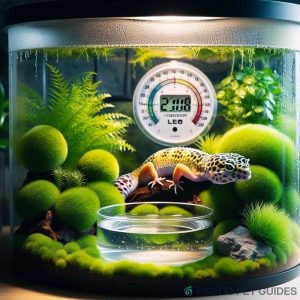Introduction
Leopard geckos (Eublepharis macularius) are one of the most popular pet reptiles due to their calm temperament, beautiful patterns, and relatively low maintenance. However, a proper tank setup is crucial to ensure their health and happiness. In this guide, we’ll walk you through every step of setting up a leopard gecko enclosure that mimics their natural habitat.
1. Choose the Right Tank Size
For one adult leopard gecko:
- Minimum: 20-gallon long tank
- Bigger is better for enrichment and temperature gradients
Avoid vertical tanks. Leopard geckos are terrestrial and need more floor space, not height.
2. Substrate: Safe and Practical Options
Avoid loose substrates like sand – they can cause impaction if swallowed.
Recommended substrates:
- Reptile carpet
- Slate tiles
- Paper towels (for juveniles or quarantine)
3. Heating and Lighting
Leopard geckos are ectothermic, so they need a warm side and a cool side.
Ideal temps:
- Warm side: 88–92°F (31–33°C)
- Cool side: 72–77°F (22–25°C)
Use:
- Under tank heater (UTH) with a thermostat
- Optional: Low-wattage UVB bulb (improves vitamin D synthesis)
4. Hides and Decor
Provide at least 3 hides:
- Warm hide
- Cool hide
- Humid hide (with moist sphagnum moss or paper towel)
Extras: Branches, fake plants, rocks (ensure stable and safe for climbing)
5. Water and Humidity
- Provide a shallow water dish
- Maintain 30–40% humidity
- Mist the humid hide daily
6. Feeding Station
- Use a dish for mealworms to avoid escapes
- Dust insects with calcium + D3 powder 2–3 times a week
Conclusion
A well-set-up leopard gecko tank is more than just a glass box—it’s a safe, enriching space for your gecko to thrive. Following these steps will not only help your gecko stay healthy but also bring out its natural behaviors and charm.
👉 Looking for a full leopard gecko care sheet? [Check our complete care guide here.]

